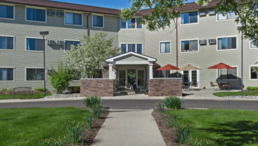Located on the banks of a picturesque river, Flint is home to a population of just under 100,000 people, 13.9% of which are seniors. The area’s sunny summers and cold winters with lots of snow make it perfect for those who enjoy a variety of seasonal activities, from fishing and boating in the summer to skating and skiing in the winter. Residents can participate in cultural activities at the Flint Institute of Arts, which houses pieces made by renowned artists throughout history. Outdoor attractions include Stepping Stone Falls and For-Mar Nature Preserve & Arboretum, a 383-acre wildlife preserve.
Assisted living here costs an average of $3,669, and Michigan’s status as tax-friendly toward seniors can make Flint an even more affordable retirement destination.
Hundreds of thousands of American seniors utilize assisted living, a figure that is only growing. For these seniors, assisted living combines residential housing,assistance in daily activities, and some healthcare. These communities also strive to provide an atmosphere that is comfortable and engaging for their residents… Read More >
In Flint, assisted living costs an average of $3,669 per month. This price is lower than both state and national averages, which come to $4,200 and $4,300 respectively. Michigan has some of the area’s lowest assisted living prices, with neighboring Wisconsin averaging a more expensive $4,400 and Illinois averaging $4,575.
Assisted living costs in Flint are relatively low compared to the rest of the state. Bay City is more affordable, with a median monthly price of $3,000, as is Muskegon, which averages $3,500. Assisted living in Grand Rapids is much more expensive, at an average cost of $5,000 per month. Costs in Detroit are similar, at $4,750. Assisted living in capital city Lansing costs an average of $5,225, and Ann Arbor has some of the highest assisted living prices in the state, averaging $5,590.
Michigan’s Medicaid program offers the MI Choice Waiver, which can help pay the costs of some care services in assisted living communities. While it cannot be used to cover rent, it can pay for prescriptions, transportation and rehabilitative therapy. To learn more about this program and who is eligible, visit our Assisted Living in Michigan page.
| Contact | Description | |
| Valley Area Agency on Aging | (810) 239-7671 | The Valley Area Agency on Aging provides a wide variety of senior programs, including care management, mental health counseling and legal services. Seniors can get medical equipment and personal emergency response devices as well as access transportation services and support groups. Specialized services for the hearing and visually impaired are available, as are fraud and elder abuse prevention initiatives. |
| Flint Township C-A Senior Center | (810) 732-6290 | A robust calendar of social and educational activities includes games, crafts and sports. This senior center offers a Medicaid assistance program and a scam awareness initiative as well as emergency rent assistance services. A loan closet makes assistive devices like walkers and wheelchairs available for a small deposit. |
| Genesee County Department of Veterans Services | (810) 257-3068 | This state-run organization helps veterans determine their eligibility and secure access to federal financial assistance programs. Service members can also access mental health counseling and transportation to and from VA hospitals. |
| Catholic Charities of Shiawassee and Genesee Counties | (810) 232-9950 | This charity’s PEARLS program offers educational seminars designed to help seniors live fulfilling lives. These classes can cover topics such as healthy aging, adult depression and emotional health. Mental health counseling and religious guidance services are also available here. A community closet offers clothing and household goods at low or no cost. |
| Legal Services of Eastern Michigan | (810) 234-2621 | Seniors and low-income adults can get help with civil matters such as housing and debt disputes. Self-help tools are available and elderly citizens can arrange in-home legal assistance. |
Michigan’s Department of Human Services is responsible for ensuring that assisted living communities follow safe housing and care practices. To learn more about state regulations for senior care, visit our Assisted Living in Michigan page.

















